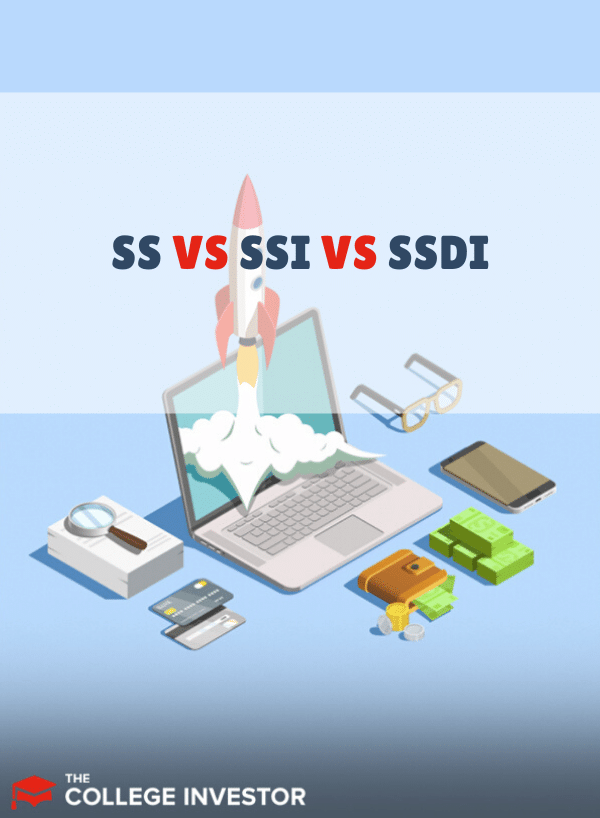
Social Security (SS), Supplemental Security Income (SSI), and Social Security Disability Benefits (SSDI) are three federal benefit programs that can provide income to Americans who aren't able to work. SS, SSI, and SDI are all are managed by the Social Security Administration.
Each of these programs, however, have different purposes and eligibility requirements. However, when it comes to taxes and financial aid, it can be confusing to understand how each work. For example, do you need to include SSDI benefits received on the FAFSA?
But how exactly do these programs work? And how do they play into your tax bill? In this article, we’ll look at each one and their impact on your paycheck, taxes, and FAFSA.
What is Social Security (SSA)?
The Social Security (SS) tax is part of a group of payroll taxes mandated by FICA (the Federal Insurance Contributions Act). One component is the Social Security tax (or the Old-Age, Survivors, and Disability Insurance) and the other component is the Medicare tax. These FICA taxes fund your retirement and disability benefits.
When people refer to Social Security (or SS), they are typically referring to Social Security retirement benefits.
Related: What Young Investors Should Know About Social Security
How Social Security (SSA) Contributions Affect Your Taxes
The Social Security tax rate is 6.2% for the employee and the same for the employer, for a total of 12.4%. If you're self-employed, you have to pay the full 12.4%. For this reason, hiring contractors is an advantage for companies since they don’t have to pay Social Security taxes or even any payroll processing overhead.
The amount paid by the social security tax reduces your taxable income. For example, if you make $100,000, $6,200 is paid in social security taxes, leaving $93,800 to be taxed by federal and state entities. Social Security taxes are applicable to the first $168,600 of wages for 2024. The $168,600 limit is called the wage base.
The Medicare tax is split the same way — 1.45% paid by the employee and the same for the employer, for a total of 2.9%. This means your combined FICA tax rate is 7.65%. The Social Security portion of these taxes max out at $10,453.20 for 2024.
Related: FICA Taxes
How Social Security Benefits Affect Your Taxes
Once you start receiving Social Security benefits, depending on your total income and filing status, those payments may be taxable.
Those filing single with a combined income under $25,000 will not have their SS benefits taxed. Incomes between $25,000 and $34,000 will have benefits taxed at 50%. For incomes over $44,000, benefits will be taxed at 85%.
While not a Social Security tax, the Additional Medicare Tax (AMT) is applicable to those who earn more than $200,000. AMT is taxed at a rate of 0.9%.
Visit the College Investor Tax Center for more tax advice and assistance.
How Social Security Benefits Affect FAFSA
Yes, Social Security benefits do impact the FAFSA. You will need to report all taxable Social Security benefits received - which just falls into your taxable income on your FAFSA. You do not report untaxed Social Security benefits. Social Security benefits max out at 85% taxable.
What About Social Security Survivor Benefits And FAFSA?
Social Security survivor benefits that are non-taxable are not reported on the FAFSA. In the rare case that the survivor benefits are taxable due to the recipient's adjusted gross income, the taxable portion would be reported on the FAFSA.
What Is Supplemental Security Income (SSI)?
Supplement Social Security Income (SSI) is not a tax. Instead, it is a disability income paid to those who are eligible for SSI benefits. SSI benefits also are not taxed. In some cases, however, SSI recipients may have to report their SSI income on their tax return.
Supplemental Security Income (SSI) Eligibility Requirements
To be eligible for SSI, you generally must be 65 or older and have a disability. Children are also eligible to receive SSI. SSI is paid monthly through Medicaid. The amount is determined by need (i.e., "means-tested program”).
SSI is intended for those who have low income and very little in assets. Generally, if the Social Security Administration finds that the value of all your personal property and assets exceeds $2,000 for an individual or $3,000 for a couple (not counting your car and home), you won't qualify for SSI.
Supplemental Security Income (SSI) Benefit Limits
SSI amounts vary by person and do have a maximum monthly amount, set by the Social Security Administration. For 2020, those amounts are:
- $783 for an eligible individual
- $1,175 for an eligible individual with an eligible spouse
- $392 for an essential person.
SSI benefits increase in tandem with cost-of-living increases.
Is SSI Reported On The FAFSA
SSI payments are not taxable income and are NOT reported on the FAFSA.
What Is Social Security Disability Benefits (SSDI)?
Social Security Disability Benefits (SSDI) is another disability program. Many people lump the two together and simply call them Social Security disability benefits. But the main difference between them lies in their eligibility requirements.
Where SSI is needs-based, SSDI eligibility is determined from your work credits. Also, SSI is funded from general fund taxes, while SSDI is funded from the Medicare portion of the Social Security trust fund.
The idea behind SSDI is to provide an income to disabled people who paid in to the Social Security program, but aren't yet old enough to begin receiving their SS benefits. So while SSI requires recipients to 65 years of age or older, SSDI recipients must be under the age of 65.
Recipients of SSDI contribute to the Social Security trust fund while working. Their contributions are in the form of FICA Social Security taxes. Having enough work credits is a requirement for SSDI qualification.
Due to income restraints, the majority of people who receive SSDI do not pay any federal income tax on the money they receive. And most states don't tax SSDI benefits whatsoever.
What Are Work Credits?
Work credits are based on earnings. In 2024, each $1,7300 converts to one work credit. The maximum of credits that you can earn in 2024 is four ($6,920 in earnings). There are two tests that determine how much in SSDI you’ll receive. These are the:
- Recent work test, and the
- Duration of work test
Without straying too far into the weeds, the more years you’ve worked, the more credits you’ll need. But if you haven’t earned enough in work credits to qualify for SSDI, you still might still qualify for SSI.
Is SSDI Reported On The FAFSA
SSDI benefits are only reported on the FAFSA if they are taxable to the recipient. Most beneficiaries who receive SSDI are income-constrained, so the benefits are not taxable. In that case, they are also not reported on the FAFSA.
In the rare case the benefits are taxable, only the taxable amount is reported on the FAFSA.
Final Thoughts
To recap, both Social Security (SS) and SSDI (Social Security Disability Benefits) are funded through FICA taxes and are paid via the Social Security trust fund. You can begin taking your Social Security (SS) retirement benefits at age 62. But if you become disabled before you reach retirement age, you may qualify for SSDI benefits.
SSI is also a disability benefit. But with Supplemental Security Income (SSI), you'll need to demonstrate financial need to qualify and you'll typically need be at least 65 years of age or older. Each of these programs can help relieve your financial burden when you can't work. But your maximum benefits will also be limited by your need or how much you've paid in.
To further protect your income during a short or long period of disability, you may want to consider shopping for disability insurance policy from a site like Policygenius or Breeze. You can also check out our complete guide to disability insurance.
And with the instability of government programs, you should open a retirement account and save and invest as if you'll need to fully fund your retirement yourself. If you do end up receiving Social Security benefits, it will be "extra" money that you can use however you wish. Read our full guide to saving for retirement.

Robert Farrington is America’s Millennial Money Expert® and America’s Student Loan Debt Expert™, and the founder of The College Investor, a personal finance site dedicated to helping millennials escape student loan debt to start investing and building wealth for the future. You can learn more about him on the About Page or on his personal site RobertFarrington.com.
He regularly writes about investing, student loan debt, and general personal finance topics geared toward anyone wanting to earn more, get out of debt, and start building wealth for the future.
He has been quoted in major publications, including the New York Times, Wall Street Journal, Washington Post, ABC, NBC, Today, and more. He is also a regular contributor to Forbes.
Editor: Clint Proctor Reviewed by: Chris Muller
